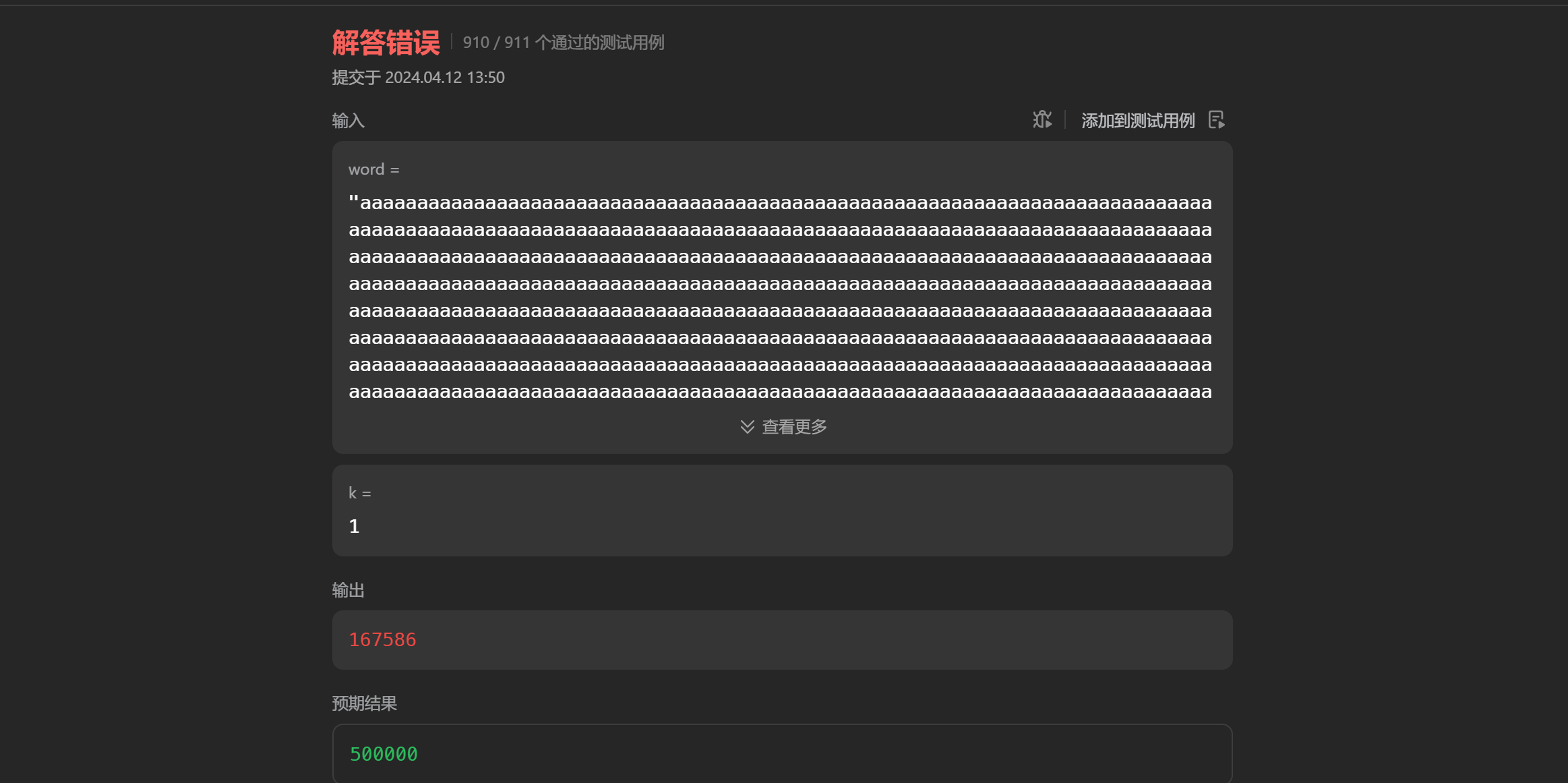字符串哈希
什么是?
定义多项式 Hash 函数:
我们可以通过该函数将字符串映射为b进制下的数字
同时我们可以预处理储存所有的前缀,然后便可以
模板
cpp
struct StrHash{
int MOD,BASE,n;
vector<int> p,h;
StrHash(int n_=0){
randing();
init(n_);
}
StrHash(string s){
randing();
init(s.size());
work(s);
}
void init(int n_){
n=n_+1;
p.assign(n, int{});
h.assign(n, int{});
p[0]=1;
h[0]=0;
}
void randing(){
srand(time(0));
MOD = 998244353 + rand() % 10008;
BASE = 33 + rand() % 234;
}
void work(string s){
for(int i=1;i<n;i++){
p[i] = ((long long)p[i - 1] * BASE) % MOD;
h[i]=((long long)h[i-1]*BASE+s[i-1]-'a')%MOD;
}
}
int get(int l,int r){
return (h[r] - (long long) h[l-1] * p[r-l+1] % MOD + MOD) % MOD;
}
};cpp
int p[N];
int h[N];
int query(int l,int r,int MOD){
return (h[r] - h[l-1] * p[r-l+1] % MOD + MOD) % MOD;
}
void hhhh()
{
string s;
cin >> s;
int n = s.size();
srand(time(0));
const int MOD = 998244353 + rand() % 10008;
const int BASE = 33 + rand() % 234;
p[0] = 1;
h[0] = 0;
For(i, 1, n + 1) {
p[i] = (p[i - 1] * BASE) % MOD;
h[i]=(h[i-1]*BASE+s[i-1]-'a')%MOD;
}
int m=read();
For(i,0,m){
int a=read(),b=read(),c=read(),d=read();
if(query(a,b,MOD)==query(c,d,MOD))print("Yes");
else print("No");
}
}py
import random
s = input()
n = len(s)
random.seed()
MOD1 = 998244353 + random.randint(0, 10007)
MOD2 = int(1e9+7) + random.randint(0, 233)
BASE1 = 33 + random.randint(0, 233)
BASE2 = 133 + random.randint(0, 53)
b1 = [1]
b2 = [1]
h1 = [0]
h2 = [0]
for i in range(n):
b1.append(b1[i] * BASE1 % MOD1)
b2.append(b2[i] * BASE2 % MOD2)
h1.append((h1[i] * BASE1 % MOD1 + ord(s[i]) - ord('a')) % MOD1)
h2.append((h2[i] * BASE2 % MOD2 + ord(s[i]) - ord('a')) % MOD2)
# 从0开始,左闭右闭
def query(l, r):
hash1 = (h1[r + 1] - h1[l] * b1[r - l + 1] % MOD1 + MOD1) % MOD1
hash2 = (h2[r + 1] - h2[l] * b2[r - l + 1] % MOD2 + MOD2) % MOD2
return hash1, hash2例题
幽默一刻:
单随机模数和BASE中奖,给测试用例卡掉了,再提交一遍不改代码就过了
py
class Solution:
def minimumTimeToInitialState(self, word: str, k: int) -> int:
"""
思维转换
"""
# 最坏情况
s=word
# 哈希板子
n=len(s)
ans=ceil(n/k)
random.seed()
MOD1 = 998244353 + random.randint(0, 10007)
MOD2 = int(1e9+7) + random.randint(0, 233)
BASE1 = 33 + random.randint(0, 233)
BASE2 = 133 + random.randint(0, 53)
b1 = [1]
b2 = [1]
h1 = [0]
h2 = [0]
for i in range(n):
b1.append(b1[i] * BASE1 % MOD1)
b2.append(b2[i] * BASE2 % MOD2)
h1.append((h1[i] * BASE1 % MOD1 + ord(s[i]) - ord('a')) % MOD1)
h2.append((h2[i] * BASE2 % MOD2 + ord(s[i]) - ord('a')) % MOD2)
# 从0开始,左闭右闭
def query(l, r):
hash1 = (h1[r + 1] - h1[l] * b1[r - l + 1] % MOD1 + MOD1) % MOD1
hash2 = (h2[r + 1] - h2[l] * b2[r - l + 1] % MOD2 + MOD2) % MOD2
return hash1, hash2
def check(a,b):
return query(0,a)==query(b,n-1)
for t in range(1,ans):
if check(n-t*k-1,t*k):
return t
return ans